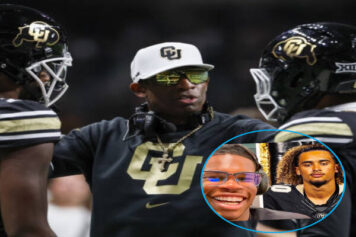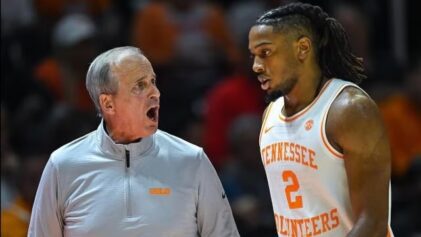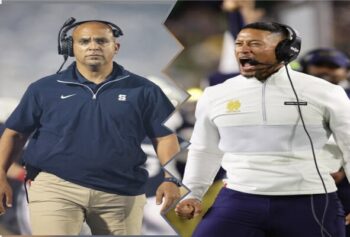Allen Greene found his passion and purpose through sports, and now he’s inspiring others as Auburn’s young, dynamic Athletic Director.
In The Shadow League’s latest series, The Climb, we highlight remarkable individuals on the business side of the games we love who are just as important as the athletes who play them. Today’s feature shines a light on Auburn Athletic Director Allen Greene.
***
The young lady’s hand was trembling. She tried to speak, but the words remained stuck in her throat. Then, the tears slowly crept out of the corners of her watery eyes.
After a few deep breaths, she looked at Allen Greene and the ensuing syllables spilled out unsteadily.
“It’s. So. Nice. To. Meet. You,” she said, struggling through each pause.
That stirring moment in January of 2018, after an initial meet-and-greet with Auburn’s athletic department staff, shook Greene to his core.
At the age of 41, he’d just recently been named the Athletic Director at Auburn University, becoming one of the youngest people in the country to hold the A.D. position at an NCAA Power Five school.
“I told them about myself, my expectations for the department and how we need to treat and care for one another,” said Greene. “Afterwards, some people came up to shake my hand and introduce themselves. When that young lady shook my hand and started crying, that took me back. I wasn’t expecting nor was I prepared for that type of emotional interaction.”
THE MAKINGS OF A MAN
Greene’s parents divorced when he was just three years old. But that didn’t stop them for working amicably together to raise him. He initially lived with his mom, Lynda, in Rock Island, Illinois but traveled often to visit his father in Seattle.
At the age of 11, he moved in with his father, Claude, full-time, with his mother soon coming to the Emerald City so that he could have both of his parents in his life on a daily basis,
“Both of my parents were very much involved in my upbringing, and I felt their love and understanding, despite the fact that they weren’t together,” said Greene. “They both offered a tremendous amount of wisdom in their own ways.”
His mother was driven by an entrepreneurial spirit and he watched as she fought to create and establish her own businesses. His father, a corporate executive, was a people-person who taught him to have an appreciation for others. He also pushed him to be secure in the fact that life wasn’t about being selfish, but rather how one could best serve others.
“I utilized a combination of what they both taught me as my compass for leadership,” said Greene.

(All Photos Courtesy of Auburn Athletics)
That inner drive and compass was evident early on, from his very first job delivering newspapers.
At the age of nine, after spraining his wrist, he made his own sling and devised a new way to bundle his papers so that he could continue making his deliveries on his skateboard.
“I refer to him as an old soul in a child’s body,’’ Lynda told The Seattle Times. “He was that way from the moment he was born. I still laugh – even as a 5-year-old it was like having a conversation with an adult.”
KICKING BUTT AND TAKING NAMES
When sports became a part of his life, his competitive drive was apparent from day one. Sitting in his father’s Ford Maverick prior to a T-Ball game, young Allen looked at his dad, pounded his glove and said, “I’m ready to kick butt and take names!”
It was a phrase that he often heard his father say.
“From a very early age, even just playing with my friends in the neighborhood, I remember being very serious about competing to win,” said Greene. “It wasn’t til I got older when I realized that it was always kind of a part of my spirit.”
Whatever sport was in season, Greene was outside playing it. Football, baseball, basketball, soccer, he did it all.
“I just loved to be outside playing with my friends,” he said.
When he reached his teenage years, he began to take athletics more seriously. In high school, he played wide receiver on the football field. As a shooting guard, with Seattle as a serious hoops hotbed, he competed against the likes Jason Terry on the hardwood. On the baseball diamond, he was a sweet-stroking shortstop and outfielder.
“Basketball was probably my first true love, but I decided to focus on baseball because I felt that it gave me the better opportunity to play at the next level,” he said.
As a sophomore at O’Dea High School, he began to write down his goals, posting them on the ceiling of his bedroom and on the mirror in his bathroom. He wanted them to be the first things he saw prior to going to sleep and upon waking up.
“That was simply about believing in positive affirmations,” said Greene. “The mind is so powerful and now that I’m older I really appreciate that.”
On the diamond, he had the “It” factor, and one of his summer league coaches, Tom McCabe, took a special interest in him. The two not only worked on skill development, but the other aspects that separate the pretenders from the contenders.
“He always stressed that you walk with your chest out and shoulders back at all times,’’ said Greene. “That stayed with me.”

“Even at 16, you could tell he was special,’’ McCabe told The Seattle Times.
McCabe reached out to Brian O’Conner, who was the recruiting coordinator at the University of Notre Dame at the time and is now the head baseball coach at the University of Virginia. O’Conner flew out to Seattle to watch him play, but the game was rained out.
“So we went to the Funplex, where they have arcade games, go-carts and batting cages,” said Greene. “You’d put a quarter into the machine and hit ten balls. That’s how Notre Dame evaluated me.”
As a high school senior, he was selected with a low pick in the Major League Baseball Draft.
“It was in a late enough round where it didn’t make sense for me to entertain it,” said Greene. “And Ryan Dempster got drafted out of Notre Dame with a high pick, which opened up a scholarship for me to go there.
COLLEGE DAYS
As a freshman in South Bend, Indiana, there were some initial struggles to adjust. In Seattle, he’d gone to a diverse catholic high school at O’Dea, but admits to feeling jealous when speaking to some of friends that were attending Morehouse College.
“My friends at HBCU’s were sharing their experiences and I did feel, to an extent, like I was missing out,” said Green. “But I chose Notre Dame because I knew the network was strong, that I’d get a tremendous education and that I could play sports at a high level.”
Thousands of miles from his friends and family in Seattle, there was some initial homesickness. But his teammates, the new friends that he made in his dorm and in his classes, along with other freshman athletes on campus helped make the transition easier as relationships began to build.
During his freshman year, his father flew out to visit and was amazed at how each minute of the day was accounted for.
After an early wake-up, there was breakfast, classes, lunch, more classes, baseball practice, dinner, tutoring sessions and study hall before heading back to the dorm at 10:00 PM to consume vast amounts of popcorn while watching movies on VHS tapes.
“I don’t know how you do this,” Claude marveled.
Greene excelled on the diamond as a switch-hitting outfielder for three years at Notre Dame. In the 1998 MLB Draft, he was selected in the ninth round by the New York Yankees after his junior season. His teammate, pitcher Brad Lidge, was taken in the first round by the Houston Astros.
After playing summer ball in the Yankees farm system in Oneonta, New York, he returned to South Bend for his senior year. Without the structure that being on the baseball team provided, he internalized a valuable lesson.

“Being back on campus without sports, I realized that the more you have to do, the more you get done,” he said. “When I didn’t have obligations outside of class, I noticed that I got really lazy with my school work and became a worse student. I learned to keep myself busy because I could accomplish a lot more that way.”
Playing minor league ball soon became a more humbling lesson. He’d always been on All-Star teams, elite travel squads and one of the best players on any team that he suited up for since grade school.
Playing pro ball, that quickly changed.
“Baseball is a game of failure, and you have to learn to deal with that,” Greene said. “When you’re in pro ball and the team tells you that they don’t have room for you, that’s tough. My ego took a big hit.”
He realized that the game was no longer just a game, but a business. He also learned about himself in ways that he’d rarely contemplated before.
Prior to spring training, he’d work out at the team’s facility in Florida where he got to interact with the Yankees’ soon to be legends like Derek Jeter, Bernie Williams and Mariano Rivera.
He’d once placed those guys on a pedestal, but soon came to learn that, their baseball gifts aside, they were simply regular people.
And some of his most valuable lessons came from the game’s less glamorous side.
“The best part, for me, was the six-to-ten-hour bus rides in the middle of the night,” said Greene. “We were just roughing it and those are some difficult circumstances to excel in. To be able to play a few years in that environment made me feel that I could do anything. There isn’t a circumstance that I’ll go through that I don’t feel like I can handle. If it wasn’t for those long bus rides and rough trips, I’m not sure if I’d have the grit that I possess today.”
Roughing it in the minor league’s, and knowing that he was a long shot to make it to the Majors, did not adversely affect his drive and spirit.
After three years of chasing his dream, he knew that it was time to transition to something else.
“The luster of making it to the big leagues to acquire material things didn’t resonate with me any more,” he said. “I was at peace. I knew that there were other things that I could do. Thanks to my upbringing, pro sports was always Plan B for me. My education was always Plan A. It was an emotional shock to my system to not tie myself to baseball anymore, but I knew I’d gotten a degree from Notre Dame for a reason.”
When the MLB dream ended, he didn’t feel anxious or nervous. He just hadn’t quite yet figured out what the next step would be.
MOVING ON
At the age of 24, when he stopped playing baseball, he had no idea what athletic administration was, nor that it would soon be his calling.
His college sweetheart, Christy, whom he met at Notre Dame, was finishing up grad school at the University of Pennsylvania.
“It was love at first sight for me. For her, well, I’m still waiting,” he jokes.
He moved to Philadelphia to be with the woman that he loved, and whom he’d eventually marry, and took a stab at real estate and property management.
“She was my rock, so I went to support her while trying to figure out what I really wanted to do with myself,” said Greene.

When Christy moved back to South Bend to take a job at Notre Dame after grad school, Greene followed, still unsure of what his professional passion was. He went to work for a small web development company as a project manager, where he learned to write code and build websites. He eventually transitioned into working on the financial side of the business.
But a trip to the Fighting Irish baseball facility one night after work sparked an epiphany.
FINDING HIS PASSION AND PURPOSE
“I would always drive by the baseball stadium on my way home and one night I stopped over to catch a game, see my coaches and hang out with the guys,” said Greene. “It felt good to be part of the team again.”
While taking in the action, he noticed two men in suits, Bill Schall and Bernard Muir, the respective Athletic Directors at Marquette and Stanford. He knew who they were, but didn’t know what they did as AD’s.
Greene introduced himself and sparked a conversation about what they did in their respective roles with their universities. He walked away thinking about being around the business side of college sports as a profession and said to himself, “I want to do that.”
To him, as someone with a competitive fire that loved college athletics, it was a match made in heaven.
Greene pursued a number of job openings at Notre Dame and landed his first gig in their compliance office. He worked in that capacity for five years and spent the next two in the fundraising office.
“I was probably in compliance longer than I needed to be, but you have to have patience,” he said. “It was a fantastic experience, working from the ground up. And interacting with the school’s top-level donors proved invaluable.”
He then took a position as a front line fundraiser at Ole Miss where he was essentially a road warrior, being anywhere and everywhere to garner support for the Rebels’ athletic department.
“That was my first time being in someone’s office asking for money,” he said. “And personally, it was my first time living in the deep south. I had certain notions on what that was like, but Oxford far exceeded my expectations. The people were great. I was calling on people that attended Ole Miss in the ‘60s, which was when James Meredith integrated the school.”

“It was a unique time for someone like me, who wasn’t a Southerner, calling on people who supported segregation when they were teenagers,” he continued. “Now they’re in their 60’s, and I’m a person of color asking them to support their alma mater. There was an evolution that had occurred. I’m so grateful to have gone through that experience.”
CLIMBING THE LADDER
Danny White, the current Athletic Director at Duke, brought Greene with him to Ole Miss when he was heading the fundraising operation there. And when White got the job as the Athletic Director at the University of Buffalo, he brought Greene with him to serve as the senior associate athletic director for administration and deputy director of athletics.
“I was Danny’s #2 guy, the operations person managing the day-to-day,” said Greene. “A few years later, he got the opportunity to be the A.D. at Central Florida, and I was fortunate to step into the job at Buffalo. Things fell into place from there.”
Greene was instrumental in building donor and corporate support for Buffalo athletics, including arranging an apparel partnership with Nike. He also spearheaded development of the the school’s athletics facilities master plan and led several capital projects, including the approval of an $18 million, 92,000 square-foot indoor practice facility that had been on the docket for nearly two decades.
With his previous experience working in the Southeast Conference at Ole Miss combined with the early resume he began building at Notre Dame, Auburn soon interviewed him for their Athletic Director position.
Going back to his student days in South Bend, Greene had long paid attention to his brand. He’d always carried himself with the consummate professionalism on every step of his journey.
“What I told the search committee was, ‘You can go as far back as you want in my history and call whomever you want, and I know what they’re going to say, because I’ve been that way for over two decades and I’ve not deviated from who I am,’” said Greene. “No matter who you ask, they’ll say the same thing.”
As for being up to the task of taking the huge leap from Buffalo to Auburn, he was far from intimidated and felt prepared, given the scope of his life experiences.
“I’ve struck out more times than I care to admit, but I’ve always rebounded,” he said. “And I know enough about myself, how to deal with people and about this industry, to make an impact. I can just be myself here and I think it marries well with what Auburn needs at this point in time.”
Among the myriad of responsibilities in his new job, Greene boils the most important aspect down to one element.
“We do things to help young people grow and develop so that they can contribute to society and their communities when they’re done with school,” he said. “That’s why I get up and come to work every day.”
As for the impact he’s already made, he’s humbled when he thinks of that one young lady who trembled and shed tears when she met him.
“It’s heavy,” Greene said. “I don’t go through my day thinking that I’m the first person of color to lead this department. But deep down, I knew I always represented more than just myself. I represent people that look like me, people with diverse backgrounds, and I have an obligation to do what I can to reach back down and help other people, people who are underrepresented, grow.”

“I appreciate the fact that I’m able to give people hope,” he went on. “That means a lot to me.”
It means even more to others who can look at his example, be inspired and say, like Greene once did, “I want to do that!”



